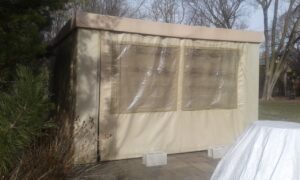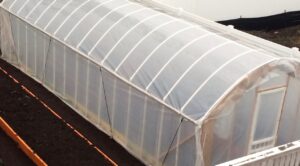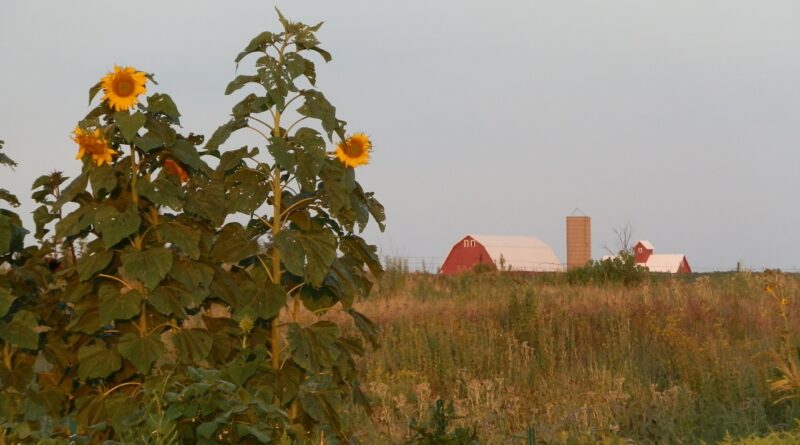Having a Virtual IMPACT on Landscapes
Podcast: Play in new window | Download (Duration: 1:43:05 — 47.2MB)
Subscribe: Apple Podcasts | Spotify | Android | iHeartRadio | Podchaser | Email | TuneIn | RSS | More
(October 11, 2020) Okay, that headline is a play on words. But the message is still a serious one. This is the time of year when the Illinois Landscape Contractors Association (ILCA) holds its annual IMPACT Conference. And, like pretty much every other event during this pandemic year, the conference will be streamed. Hence, literally, ILCA will be having a virtual IMPACT on Landscapes. Regardless, the efforts to be smarter about landscaping must continue, because climate change and species loss are not slowing down.
Skip to a specific segment in this podcast
7:24 Jack Pizzo of Pizzo & Associates, Kim Eierman from EcoBeneficial
57:33 Nicole Virgil from Right to Garden
1:26:19 Meteorologist Rick DiMaio
I have a little bit of history with the IMPACT Conference. Here’s what I wrote when Peggy and I reported on it last year.
A long time ago (2002) in an eco-system far, far away….a group of hort-warriors identified themselves as the Midwest Ecological Landscape Alliance, sometimes known as MELA. Their mission was to find less environmentally destructive ways of creating urban, suburban and exurban landscapes. How do I know about this? I was one of the two co-founders of the organization.
Sadly, this organization was forced to give up the ghost a couple of years ago. Fortunately, however, the Illinois Landscape Contractors Association (ILCA) seemed to understand the need for forward-thinking horticulture, and welcomed a number of the former MELA members into the Sustainable and Ecological Landscape Committee.
The Annual MELA Conference had been a big part of our organization’s outreach. That event has morphed into the IMPACT Conference: Building Sustainable Landscapes. This year’s conference runs from October 16-23 and combines on-demand sessions with a 5 hour live program. Attendees can view 8 on demand sessions starting October 16th. Then, on October 23rd, folks can log on for the live program moderated by Jennifer Jewell of Cultivating Place, who was on our show earlier this year. Sessions feature Jack Pizzo from The Pizzo Group, Samuel Irwin of Omni Ecosystems and Jeff Lorenz & Esther Scanlon, Refugia Ltd.
I’ve known Jack Pizzo for at least fifteen years, and have interviewed him numerous times. He has been in the ecological restoration business for much of his career, moving his company from Chicago’s western suburbs to 40 acres in Leland, Illinois in 1999. 32.5 acres of that site are remnant prairie an wetlands, which
Jack placed a conservation easement on to permanently protect it. This little slice of nature sits among 22,000 acres of production agriculture. It has become an oasis for migratory birds and monarch butterflies. The property is a laboratory, we have used it to understand restoration, stewardship, and propagating native plants.
In 2002, Jack and his family moved to Clare, IL, after purchasing 40 acres comprised of farmed wetland and built a home there. He restored it to prairie and wetland. It is a thriving ecosystem now. Jack also placed 37 of the 40 acres in a conservation easement to permanently protect that land. This little slice of nature sits among 38,000 acres of production agriculture. It too has become an oasis for migratory birds and monarch butterflies.
I’ve been to Jack’s home and, yes, it’s smack in the middle of conventional Illinois farmland, complete with tractors, row crops and pesticides. His live presentation on October 23 calls upon his more than 30 years in horticulture and work in sustainability. It’s titled, Kid You Don’t Know Anything! Lessons From The Field. Jack told me that he heard a lot of that as he attempted to establish his business. He says he’s still learning every day, and we’ll be the beneficiaries of that knowledge today.
By the way, we’re pleased to say that Jack’s session is sponsored by Bartlett Tree Experts, the primary sponsor of The Mike Nowak Show with Peggy Malecki.
Joining Jack on the show is Kim Eierman, who was with us earlier this year to promote her excellent book, The Pollinator Victory Garden: Win the War on Pollinator Decline with Ecological Gardening.Eierman is the founder of EcoBeneficial, a horticulture consulting and communications company in Westchester, New York.
Eierman is part of the “on demand” section of the IMPACT Conference, which is accessible starting October 16. She will be doing two sessions. The first is called, not so surprisingly, Eco-Beneficial Landscaping Strategies.
Even the most beautiful landscapes are not always healthy ecosystems. A landscape is more than a combination of trees, shrubs and perennials – it’s complex system where all living things are connected. Landscaping with an ecosystem approach contributes to species diversity, attracting and supporting more birds, butterflies, pollinators, and beneficial insects. Kim Eierman explains how the design choices you make, the plants you select, and the maintenance practices you use can make a huge difference in creating a beautiful, healthy ecosystem, filled with life.
But it’s her second session that caught my attention. It’s called Landscaping in Climate Crisis.
Climate change is here and it is impacting our landscapes – increased flooding, more frequent droughts, more extreme weather events and increasing temperatures. Ecological mismatches, record losses of native species and an increase of invasives are now the norm. Want to help fight climate change at home? Learn how the plants you choose and the landscape practices you use can help reduce the impacts of climate change and improve the environment around you.
There are other terrific speakers scheduled and you can check out the full lineup here.
Suburbs Behaving Badly
Well, one suburb in particular. I can’t remember how many times Nicole Virgil has been on our show. If life were fair, we might have interviewed her once or twice about her marvelous hoop house in the Chicago suburb of Elmhurst and moved on to other subjects. But that’s not how this saga goes.
Virgil was on our show in March of this year. Here’s what I wrote at the time.

In 2017, Nicole Virgil appeared on our show to talk about a fight she had been having with the city of Elmhurst, Illinois for two years. The issue was a hoop house in her family’s backyard, constructed to extend their growing season. Sustainability in action, right? But the city told them to take it down because it violated some kind of ordinance about allowed structures. As she writes, “The City of Elmhurst applied the permanent building code to the Virgil family’s temporary membrane structure to claim it’s illegal, while allowing other membrane structures all over town.”
When she stopped by again last year, that issue had not been resolved. That was after three city council meetings, five development planning meetings and three zoning and planning commission meetings. Getting frustrated with lack of response from her own municipality, Virgil decided that it was time to get serious. She created the Right to Garden website and YouTube channel. And she went to the Illinois General Assembly.
The Right to Garden Act has been introduced in the Illinois House (HB4704) and Senate (SB3329). The chief House sponsor is State Representative Sonya Harper of the Illinois 6th Legislative District. The primary Senate sponsor is State Senator Scott M. Bennett of the 52nd District.
Did I mention that she returned in July? And that things were no better, if not worse? Here’s part of a timeline that she sent to us about her efforts to grow food in her own backyard.

June 2020 – I approach a neighbor who lives close to City Hall with a membrane structure in plain sight of rear yard. Asked her to join our cause, assuming that since she owned a membrane structure and used is regularly, she would support making them legal. The neighbor stated that she did not care if I had the same liberty as she did, and that she is Pro-City. A quick Google search revealed that she is very connected and wealthy.
So, as we reported in July, it appears that the City of Elmhurst has dug in its heels. There seems to be no consistency to their actions. Fortunately, the media are starting to take notice. Here’s more from Nicole Virgil’s timeline.

